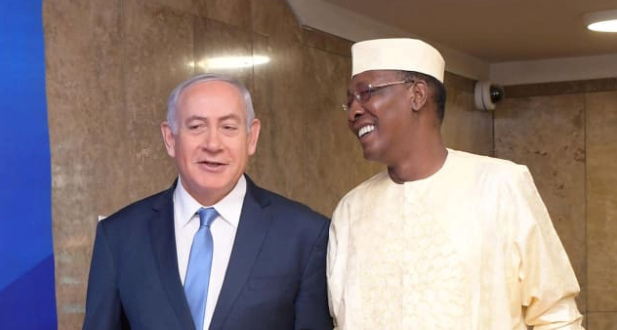Israel-Chad Rapprochement Amidst Opposition
November 30, 2018 | Expert Insights

Following Chad President Idriss Deby’s historic visit to Israel, Israeli Prime Minister Benjamin Netanyahu is to visit Chad to formally reestablish diplomatic ties between the two nations. Many in Chad are deeply opposed to Deby's Israel rapprochement.
Background
The Republic of Chad is a landlocked country in north-central Africa. While many political parties are active, power in Chad lies firmly in the hands of President Deby and his political party, the Patriotic Salvation Movement. Chad remains plagued by political violence and recurrent attempted coups d'état.
Chad had severed its ties with the State of Israel in 1972 after the Organisation of African Unity, the predecessor of the current African Union, issued a decision to its member states to cut diplomatic ties with Israel in solidarity with the Palestinians.
Chad’s President Deby became the first leader of the majority Muslim nation to visit Israel in decades, a crowning achievement of intelligence and military ties between the Deby's government and Israel.
Deby's visit was the first visit by a Chadian president since Israel was founded in 1948, which Netanyahu said reflects "the risings status of Israel among the nations." However, the visit does not entail a formal renewal of relations and comes amid heavy diplomatic efforts led by Netanyahu.
Chad's Alliance of Civil Associations for Jerusalem, a group of 22 civil organisations, issued a statement in condemning Deby's visit to Israel.
Despite relations between the two countries being formally severed in 1972, coordination between Israel and Chad in the defence arena never truly ceased. In the 1980s, foreign reports said that Israel was supplying weapons to then-Chadian dictator Hissène Habré, who was sentenced in 2016 to life in prison for crimes against humanity. Israel reportedly also sold weapons to Deby during Chad's civil war in 2005-2010.
Analysis
Opposition leaders and civil society groups in Chad denounced the central African country's President Idriss Deby's visit to Israel and his intention to establish diplomatic relations with the nation. Political and civic leaders believe Chad should not restore diplomatic ties with Israel as long as it continues to occupy Palestinian territories, and in the absence of a collective decision by African states to establish relations.
The majority of Chad's political establishment suspects that President Deby’s motive behind restoring ties with Israel is to maintain control over the country using Israeli military and intelligence assistance.
Opposition leader Mahamat-Ahmad Alhabo, head of the Freedom and Development party, opposed the rapprochement. “Israel is only looking after its own interests and intends to use Chad as a Trojan horse through which it can establish ties with other African nations. Chad should only resume ties with Israel after it stops its aggression against the Palestinians and end its illegal occupation of Palestinian lands, especially the Muslim holy places in Jerusalem,” said Alhabo.
Israel's prime minister's office said in a statement on 27 November that Netanyahu would soon visit Chad to officially establish diplomatic relations between the two countries.
Israel is embarking on major efforts on the continent and is making notable inroads towards winning the support of African states, especially in East Africa.
Arab countries have neglected Africa and left it for Israel to re-establish its presence that was once the bedrock of support for Arab causes in the international arena.
Palestinian Authority officials are seeking emergency sessions of the Arab League and the Organisation of Islamic Cooperation over Israel's increasingly close ties with some Arab countries and what is seen as the normalisation of relations with Israel.
Counterpoint
Abu Bakr Yousef Zayed, a former deputy mayor of N'Djamena and member of the ruling party during the 70s, said that Chad should not consider its religious or cultural background when debating its ties with Israel.
"Chad stands to benefit from having ties with Israel, especially since Israel has very advance military and intelligence capabilities," he said.
The two countries stand to benefit from cooperation on shared threats and the struggle against terrorism, increased cooperation between the nations in the areas of agriculture, counter terrorism, border security, technology, solar energy, water and healthcare.
Assessment
Our assessment is that while African leaders stand to benefit from access to Israeli intelligence and military training, Israel could gain a larger strategic objective. We believe that by gaining influence in Africa, Israel could increase its numbers when it comes to votes at UN organisations, such as the General Assembly and the Human Rights Council, in which African nations tend to support the Palestinians and condemn Israeli actions.








Comments